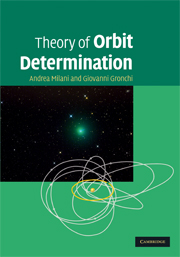Crossref Citations
This Book has been
cited by the following publications. This list is generated based on data provided by Crossref.
Milani, Andrea
Tommei, Giacomo
Vokrouhlický, David
Latorre, Emanuele
and
Cicalò, Stefano
2009.
Relativistic models for the BepiColombo radioscience experiment.
Proceedings of the International Astronomical Union,
Vol. 5,
Issue. S261,
p.
356.
Gronchi, G. F.
Dimare, L.
and
Milani, A.
2010.
Orbit determination with the two-body integrals.
Celestial Mechanics and Dynamical Astronomy,
Vol. 107,
Issue. 3,
p.
299.
Gronchi, G. F.
Farnocchia, D.
and
Dimare, L.
2011.
Orbit determination with the two-body integrals. II.
Celestial Mechanics and Dynamical Astronomy,
Vol. 110,
Issue. 3,
p.
257.
Vaduvescu, O.
Tudorica, A.
Birlan, M.
Toma, R.
Badea, M.
Dumitru, D.
Opriseanu, C.
and
Vidican, D.
2011.
Mining the CFHT Legacy Survey for known Near Earth Asteroids.
Astronomische Nachrichten,
Vol. 332,
Issue. 6,
p.
580.
Eggl, Siegfried
2011.
Refinement of Near Earth Asteroids’ orbital elements via simultaneous measurements by two observers.
Celestial Mechanics and Dynamical Astronomy,
Vol. 109,
Issue. 3,
p.
211.
Vaduvescu, O.
Birlan, M.
Tudorica, A.
Sonka, A.
Pozo, F.N.
Barr, A.D.
Asher, D.J.
Licandro, J.
Ortiz, J.L.
Unda-Sanzana, E.
Popescu, M.
Nedelcu, A.
Dumitru, D.
Toma, R.
Comsa, I.
Vancea, C.
Vidican, D.
Opriseanu, C.
Badescu, T.
Badea, M.
and
Constantinescu, M.
2011.
EURONEAR—Recovery, follow-up and discovery of NEAs and MBAs using large field 1–2m telescopes.
Planetary and Space Science,
Vol. 59,
Issue. 13,
p.
1632.
Vokrouhlický, D.
and
Nesvorný, D.
2012.
Sun-grazing orbit of the unusual near-Earth object 2004 LG.
Astronomy & Astrophysics,
Vol. 541,
Issue. ,
p.
A109.
Nugent, C. R.
Margot, J. L.
Chesley, S. R.
and
Vokrouhlický, D.
2012.
DETECTION OF SEMIMAJOR AXIS DRIFTS IN 54 NEAR-EARTH ASTEROIDS: NEW MEASUREMENTS OF THE YARKOVSKY EFFECT.
The Astronomical Journal,
Vol. 144,
Issue. 2,
p.
60.
Hubaux, Ch.
Lemaître, A.
Delsate, N.
and
Carletti, T.
2012.
Symplectic integration of space debris motion considering several Earth’s shadowing models.
Advances in Space Research,
Vol. 49,
Issue. 10,
p.
1472.
Huang, Jiangchuan
Ji, Jianghui
Ye, Peijian
Wang, Xiaolei
Yan, Jun
Meng, Linzhi
Wang, Su
Li, Chunlai
Li, Yuan
Qiao, Dong
Zhao, Wei
Zhao, Yuhui
Zhang, Tingxin
Liu, Peng
Jiang, Yun
Rao, Wei
Li, Sheng
Huang, Changning
Ip, Wing-Huen
Hu, Shoucun
Zhu, Menghua
Yu, Liangliang
Zou, Yongliao
Tang, Xianglong
Li, Jianyang
Zhao, Haibin
Huang, Hao
Jiang, Xiaojun
and
Bai, Jinming
2013.
The Ginger-shaped Asteroid 4179 Toutatis: New Observations from a Successful Flyby of Chang'e-2.
Scientific Reports,
Vol. 3,
Issue. 1,
Hubaux, Ch.
and
Lemaître, A.
2013.
The impact of Earth’s shadow on the long-term evolution of space debris.
Celestial Mechanics and Dynamical Astronomy,
Vol. 116,
Issue. 1,
p.
79.
Vaduvescu, O.
Birlan, M.
Tudorica, A.
Popescu, M.
Colas, F.
Asher, D.J.
Sonka, A.
Suciu, O.
Lacatus, D.
Paraschiv, A.
Badescu, T.
Tercu, O.
Dumitriu, A.
Chirila, A.
Stecklum, B.
Licandro, J.
Nedelcu, A.
Turcu, E.
Vachier, F.
Beauvalet, L.
Taris, F.
Bouquillon, S.
Pozo Nunez, F.
Colque Saavedra, J.P.
Unda-Sanzana, E.
Karami, M.
Khosroshahi, H.G.
Toma, R.
Ledo, H.
Tyndall, A.
Patrick, L.
Föhring, D.
Muelheims, D.
Enzian, G.
Klaes, D.
Lenz, D.
Mahlberg, P.
Ordenes, Y.
and
Sendlinger, K.
2013.
739 observed NEAs and new 2–4 m survey statistics within the EURONEAR network.
Planetary and Space Science,
Vol. 85,
Issue. ,
p.
299.
Desmars, J.
Bancelin, D.
Hestroffer, D.
and
Thuillot, W.
2013.
Statistical and numerical study of asteroid orbital uncertainty.
Astronomy & Astrophysics,
Vol. 554,
Issue. ,
p.
A32.
Spoto, Federica
Milani, Andrea
Farnocchia, Davide
Chesley, Steven R.
Micheli, Marco
Valsecchi, Giovanni B.
Perna, Davide
and
Hainaut, Olivier
2014.
Nongravitational perturbations and virtual impactors: the case of asteroid (410777) 2009 FD.
Astronomy & Astrophysics,
Vol. 572,
Issue. ,
p.
A100.
Farnocchia, D.
Chesley, S. R.
Tholen, D. J.
and
Micheli, M.
2014.
High precision predictions for near-Earth asteroids: the strange case of (3908) Nyx.
Celestial Mechanics and Dynamical Astronomy,
Vol. 119,
Issue. 3-4,
p.
301.
Lucchesi, D M
Anselmo, L
Bassan, M
Pardini, C
Peron, R
Pucacco, G
and
Visco, M
2015.
Testing the gravitational interaction in the field of the Earth via satellite laser ranging and the Laser Ranged Satellites Experiment (LARASE).
Classical and Quantum Gravity,
Vol. 32,
Issue. 15,
p.
155012.
Cicalò, S.
Schettino, G.
Di Ruzza, S.
Alessi, E. M.
Tommei, G.
and
Milani, A.
2016.
The BepiColombo MORE gravimetry and rotation experiments with the orbit14 software.
Monthly Notices of the Royal Astronomical Society,
Vol. 457,
Issue. 2,
p.
1507.
Dirkx, D.
Lainey, V.
Gurvits, L.I.
and
Visser, P.N.A.M.
2016.
Dynamical modelling of the Galilean moons for the JUICE mission.
Planetary and Space Science,
Vol. 134,
Issue. ,
p.
82.
Žižka, J.
Galád, A.
Vokrouhlický, D.
Pravec, P.
Kušnirák, P.
and
Hornoch, K.
2016.
Asteroids 87887 – 415992: the youngest known asteroid pair?.
Astronomy & Astrophysics,
Vol. 595,
Issue. ,
p.
A20.
Wie, Bong
and
Ahn, Jaemyung
2017.
On Selecting the Correct Root of Angles-Only Initial Orbit Determination Equations of Lagrange, Laplace, and Gauss.
The Journal of the Astronautical Sciences,
Vol. 64,
Issue. 1,
p.
50.





